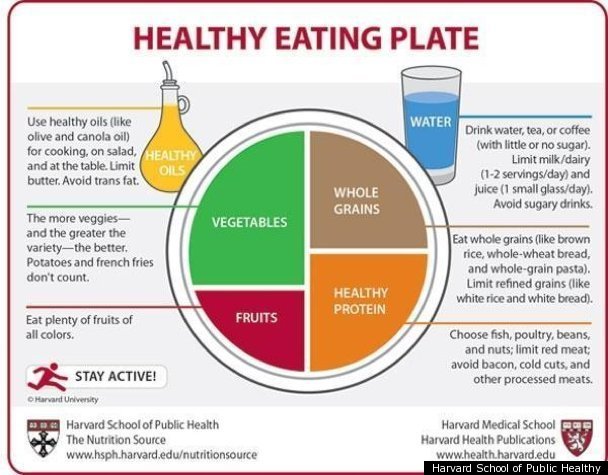Many people think that because they're in college, they are limited to cafeteria food and fast food. However, with a little bit of effort, one can increase the variety in their diet. Some college campus food can be pretty healthy, but there are definitely also unhealthy options. Just because there are unhealthy options, does not mean you have to also eat unhealthy. Many schools offer shuttles to near by grocery stores so you can pick up nutritious snacks. Also, there are many tricks you can use in the cafeteria to make a healthy, but still delicious, meal!
This photo is something that every plate you eat at the cafeteria should emulate. Try to incorporate as many colors on your plate as possible. Eat lots of colorful veggies and fruit!
 |
| click on the photo for more health tips! |
*Here's a tip for those of you who aren't so keen on veggies. Make a fruit smoothie and incorporate a handful of spinach! I swear you can't even taste it! Spinach is super rich in iron, vitamin K, and vitamin A. You can pick up a single serve blender at Target, Walmart, and many other stores. I recommend the Hamilton Beach Single Serve Blender, it's compact so it'll fit in any dorm rooms and they come in a variety of colors!
 |
| click on the photo for more info on this model of blender |
It is scientifically proven that vitamin rich food is beneficial for brain development. As college students, we are constantly learning and expending energy on our brain. To keep a balance life and sound mental health, we must keep our bodies in tip top shape with healthy eating. After all, you are what you eat.
-Ulri
 In order to engage, you need to connect with the material you’re learning. It helps to enjoy the topic that you’re studying, but you can probably find a connection to something you love even in an uninteresting class. For example, if you like geography and are in a not-quite-engaging history class, you could try to focus on how geography influenced the history you’re studying. As you begin to link together the things you’re learning, ask questions and look for answers. Talk to your professors about these connections. It’s an incredibly engaging way to learn, but in the end, you’ll probably discover that you have a good grade to show for it as well. You'll perform much better if you play to your strengths rather than try to be good at everything.
In order to engage, you need to connect with the material you’re learning. It helps to enjoy the topic that you’re studying, but you can probably find a connection to something you love even in an uninteresting class. For example, if you like geography and are in a not-quite-engaging history class, you could try to focus on how geography influenced the history you’re studying. As you begin to link together the things you’re learning, ask questions and look for answers. Talk to your professors about these connections. It’s an incredibly engaging way to learn, but in the end, you’ll probably discover that you have a good grade to show for it as well. You'll perform much better if you play to your strengths rather than try to be good at everything.





